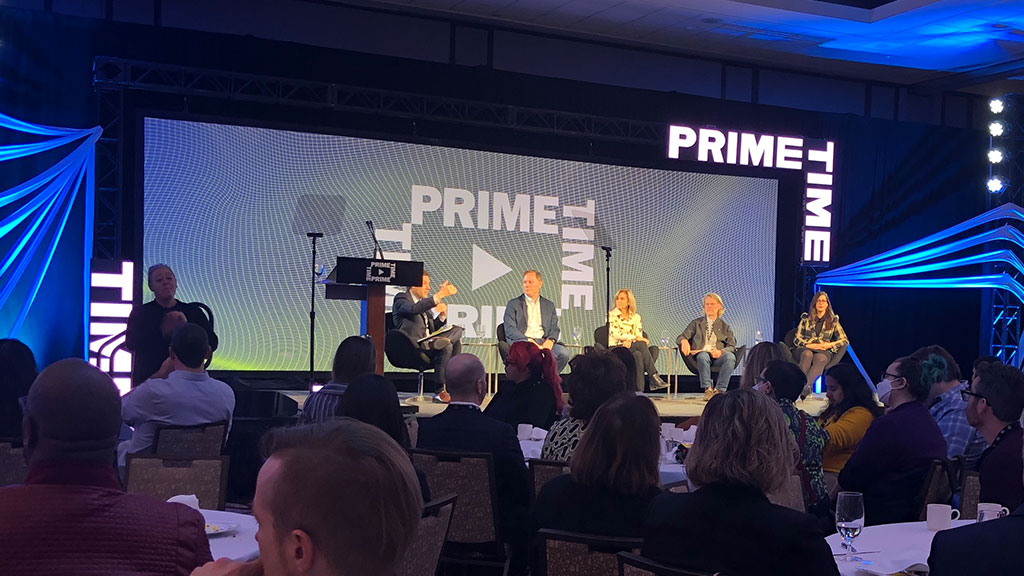Expert Series: APM's Caron Nightingale at CMPA Prime Time 2023 Ottawa

Panel featuring Michael MacMillan, CEO of Blue Ant Media
By Ted Reyes
The Canadian Media Producers Association recently concluded its annual trade event, considered the pre-eminent gathering of media professionals in the country: Prime Time 2023.
Held at The Westin Hotel in Ottawa from February 1-3, the conference was the first in-person CMPA event since the COVID-19 pandemic hit in 2020. The well-attended summit covered many topics, from diversity to technology to the much-discussed legislation surrounding digital media, the C-11 Bill, also known as the Online Streaming Act.
We chatted with APM's Director of Sales, Caron Nightingale, who shared her insights about the Canadian media landscape and key takeaways from the panels she attended during the three-day event.
Is this your first time attending Prime Time?
Caron: Yes
Why do you think Primetime is a must-attend conference?
Caron: The CMPA's Prime Time conference is a 3-day event where Canada's thought-leaders, trendsetters, and policymakers in film & TV meet to pitch projects, discuss policy, and try to both predict and shape the future of the industry. I attended Prime Time to learn more about how our industry is evolving and how we can have a role in its future. There were great panels about protecting our Canadian content makers, the plans to assure diversity and inclusion, and of course, a big part of the conversation was about sustainability and Bill C-11. It was also a great opportunity to meet with our existing clients from across Canada and mingle and network with new ones!
There is much discussion about the C-11 Bill or the Online Streaming Act and how it will affect the Canadian broadcasting industry. Can you share some critical points from the esteemed panelists? What about you? Can you share your POV on this piece of legislation?
Caron: The bill just passed its third reading at the Senate during Prime Time, but as Michael MacMillian (CEO of Blue Ant) said at the conference, "The devil is in the details," and there will be a lot of discussion on the interpretation of the amendments once they pass into law. The bill and its 26 amendments are now with the House of Commons waiting for review.
I asked John Welsman, President of the Screen Composers Guild of Canada (SCGC), to give a summary of the main aspects of this Bill C11: "Canada's current regulatory framework for broadcasting (which has not been updated since 1991) requires cable and satellite providers to contribute a percentage of their revenues to funds that support the creation of Canadian content. That framework also requires over-the-air TV and radio broadcasters, and specialty and pay channels, to program certain amounts of Canadian content. Bill C-11, the Online Streaming Act, will establish new financial contribution and content discoverability requirements for Canadian and foreign streaming platforms operating in Canada. The final details of these new obligations will be worked out by the CRTC over the coming year or so. By leveling the regulatory playing field between traditional content platforms and online platforms, Bill C-11 is a huge win for all who work in our industry".
Pablo Rodrigues, Minister of Canadian Heritage, who spoke at Prime Time, summarized it as this: "At the end of the day, this bill is about making sure streaming platforms that benefit from broadcasting to Canadians contribute to our culture".
In terms of how I feel about C11, I am certainly in favor of a Bill that protects Canadian culture and supports its growth, but the amendments are complicated, and the challenge is going to be in interpreting them once they become law. One of the amendments, for example, deals with the definition of Canadian content. Currently, a program can be certified as 'Canadian Content' (CanCon) when a certain number of "points" have been awarded based on the number of Canadians working on the film in principal creative roles (i.e., Director, Producer, Composer). There are those who wish that the requirements for CanCon be loosened to include productions that are simply "about" Canada or Canadians (not necessarily "made" by Canadians). That would mean that the streamers or foreign production companies might qualify for CanCon simply by making a movie about a Canadian while hiring a non-Canadian cast and crew. I should add, that part of this initiative is to also keep the ownership of the production (IP) in Canada. Most of our industry would like to see the Bill support Canadian-made productions that are also owned by Canadians, thereby keeping the money, funding, jobs, and the support here. Ultimately, I don't think anyone is going to be completely happy with all the amendments, but the idea of supporting Canadians is something I think we all agree on!
Do we need the CRTC to regulate all broadcast media?
Caron: To at least some degree, yes, but again, the devil is in the details!
Is it critical to push Canadian-only talent in all media?
Caron: Well, 'push' is a strong word, but I suppose that's what it is. It should be noted, though, that the broadcasters are only being asked to dedicate a percentage of their programming time to CanCon (not all), and the streamers are being asked to help promote Canadian content by enhancing its discoverability to Canadians. Canada has incredible talent and storytellers, with some of the world's biggest artists, performers, actors, and producers, but without some level of support, we will not be able to develop (and export) some of the world's most talented people! Canada is a leader in the arts and has a very distinct voice and personality on screen. So, yes, we need to get behind them to allow them to survive and thrive.
Do you see technology as a friend or a foe, and why?
Caron: I love technology, but it's always going to be a blessing and a curse. AI can now write music, ads, and to some degree, it can produce content in every sector. It will put some people out of work, but it will also create new jobs.
As a production music executive, how will it impact the business if it becomes law?
Caron: If it becomes law, a lot more of our clients will be asking us for Canadian-written music. Currently though, only original music can qualify as CanCon under Cavco rules; however, we are working on changing that so that licensed music written by a Canadian will also qualify under the Cavco/CanCon point system. And APM is ready. APM has long supported Canadian composers. We continue to search out and add Canadian writers to our roster, and our search engine has long had a search filter that allows our clients to search our database of over one million tracks for music written by one or more Canadian composers, which is great!
On a scale from one to ten (1-10), how do you rate the health of the Canadian film industry today?
Caron: I would say nine (9). In 2020, Canada's film and television production industry generated an impressive $9 billion in production volume, contributed $12.2 billion to the GDP, and created approximately 244,500 jobs. In 2021, there was a decline of only 4%, which is incredible considering that production pretty much halted for 4-5 months during Covid. Canada's film & Tv industry has been booming in the last ten years.
What is contributing to its success?
Caron: First, Canada is a great place to live, visit, and of course, make movies, but we have great tax incentives for filming here, which encourages producers from around the world to want to film and co-produce in Canada and with Canadians.
How critical is music to a film's success?
Caron: Don't get me started! Just think of those two notes from Jaws that will forever make you afraid to go in the water! Music can make or break a film. I think everyone agrees that great music in a film can really elevate it. But I don't think a lot of people realize that with a brilliant score, even bad dialogue or editing might be forgiven as intentional. A bad score, however, can single-handedly bring down the entire film, no matter how good everything else is. The fact is, that you will never see an Oscar-winning film with bad music. The music in your film is much more than an equal partner, and its role can't be overstated!
How does APM help in this area?
Caron: Great question and one I love answering! APM is a production music catalogue, which is music that is written or curated, primarily for licensing. Not only does APM have more than 1 million tracks, but it has every possible genre, style, and mood that you can think of, including archival music from as far back as the 1920s and as well as amazing Italian love songs from the 50s. We also have music from 185 countries, including a lot of music in their native languages. But we also have six full-time Music Directors who help with the searches (at no charge) who can find the right tracks. Our music was used in 90 Emmy-nominated productions last year, so that should give an idea of the quality of the music and who's using us. As mentioned, we also support Canadian artists and make it easier for producers to support them by making sure they know about them!

Keynote Speaker Catherine Tait President and CEO of CBC
How about Canadian TV on a scale from one to ten (1-10)?
Caron: Admittedly, there was a time when I couldn't watch Canadian TV. The writing was great, but without proper budgets, it couldn't compete with the US programs; however, Canada has upped its game considerably and is producing world-class TV. Examples – Schitts Creek, Handmaid's Tale, Murdoch, Trailer Park Boys, Due South, Degrassi, and the list goes on! When I'm looking for something to watch, Canadian television is now always on my list!
What separates APM from others:
Caron: Well, of course, this is going to sound a bit like a sales pitch, but I think this is a good time to point out that I was once a client of APM's. As a Music Supervisor, I licensed music from APM and always knew them to be the best, so in 2011, I reached out and suggested that they needed a Canadian office, and I would like to open it. The impression I had of APM in the 90s is the same as I do now. It's an incredible music company, both to work for and to license music from. What makes it different? Do you mean besides having an incredible music catalogue? A state-of-the-art search engine? Help in finding your music at no charge? Honestly, anyone who knows me knows that I am both proud and grateful to be with this company.
There's a lot of content being produced by and for indigenous communities. What fuels this drive, and how does music help tell these stories?
Caron: The indigenous community has really suffered injustices, and we're all trying to make it right. The film community is coming together to support all indigenous people working in the arts by offering grants directly to them as well as grants and incentives to companies producing Indigenous content. As a result, we see a lot of new productions by and for the Indigenous people. As for music, well, pretty much all new indigenous content creators are looking for Indigenous songwriters and musicians, giving them great new opportunities to be heard.
What albums or playlists would you recommend for indigenous content?
Caron: APM does in fact, have great Indigenous/First nations music, and we are actively adding more artists and songs to our roster. HARD music, one of our strictly Canadian libraries, has released a great album featuring First Nations artist Adrian Dion Harjo. I also produced an indigenous album featuring David R. Maracle, who is not just a world-class composer and musician, but a world-renowned sculptor – his works have been owned by Nelson Mandela and the Emperor of Japan. This album is coming soon. Here are a couple of playlists for our Indigenous/First Nations music
Contemporary Native American Hybrid
Traditional First Nations Native American
Any closing thoughts?
Caron: I would just like to gratefully acknowledge Music Publishers Canada, and especially its CEO Margaret McGuffin who does an incredible job supporting Canadian music publishers and their artists by giving them opportunities to learn, grow, network and promote their Canadian music and companies both inside Canada and Internationally. Thank you, Margaret, and your wonderful team, for everything you do.
Here is a great little two-minute video from the CMPA about how filmmaking unites us "In large part, it is the stories we tell to one another and the world. Storytelling doesn't just advance our culture; it is our culture.




